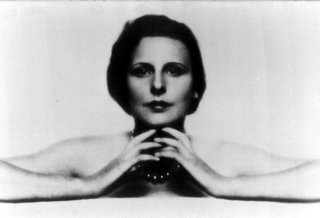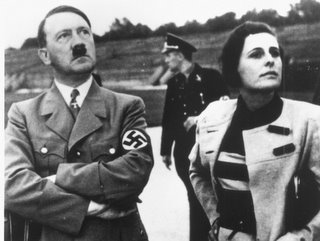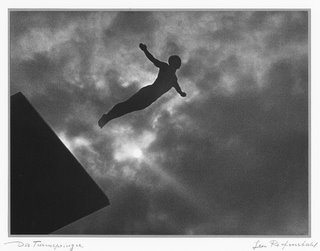Course Focuses on Nazi Filmmaker
I once worked for the Colorado Springs Gazette newspaper as an Entertainment reporter. This is one of those stories...

Originally published in the Colorado Springs Gazette
August 31, 2003
by Brandon Fibbs
This fall, the University of Colorado at Colorado Springs becomes only the second college in the United States to offer a class on one of the most controversial artists of the 20th century.

Professor Robert von Dassanowsky, chairman of Languages and Cultures and director of Film Studies, will present a course on Leni Riefenstahl, a filmmaker who is both prophet and pariah, icon and ogre, artist and traitor.
Arguably one of the greatest filmmakers to ever grace the cinema, Riefenstahl, who turns 101 this month, is largely unknown outside of her native Germany or by those who are not film aficionados.
Ignorance about her stems not from a lack of talent on her part, but from a concerted effort to crush her works because of what is seen as her unforgivable alliance to Nazi principles and Adolf Hitler.
For CU-Springs, the focus will be on Riefenstahl and her place in film history.
Impressed by Riefenstahl's artistic abilities in her debut film, "The Blue Light" (1932), and hoping to give the German people their first look at their Fuhrer, Hitler commissioned the fledgling director to film the 1934 Nuremberg Party Congress rally.

That documentary became the infamous "Triumph of the Will." The film shows an undeniably dazzling use of perspective and camera movement. Riefenstahl used crane shots, aerial perspective and dramatic points of view to capture more than a million participants including SS troops marching in review, military equipment parades, keynote speeches and the powerful images of Hitler's singular presence. It was one of three documentaries she would create recording the birth of the Third Reich.
Riefenstahl would later lament accepting the project that ultimately forced her into cinematic exile.
Von Dassanowsky, an independent producer and widely published film and cultural historian, is considered one of the foremost Riefenstahl scholars in the world. He insists that the course will not whitewash the ideology that Riefenstahl's films record and at times even celebrate.
"On the contrary - a clear understanding of Riefenstahl's appreciation of Nazism and the danger of 'Triumph of the Will' is necessary to be able to understand what follows."

According to von Dassanowsky, from Riefenstahl's documentary on the 1936 Olympics onward, there is a clear desire to distance herself from (and atone for) the sins of her past.
"The course will attempt to get beyond the stereotypes - convinced National Socialist, pure artist, career opportunist, politically naive, etc. Too much of her work has been clouded by the emotionalism brought about by such reductive notions about her person. Let's see what her art has to say for her."
The late film critic Pauline Kael once said, "If only Riefenstahl had turned her back on her Fuhrer, she might be remembered as one of the mightiest directors in film history."
Or would we ever have known her at all?

Originally published in the Colorado Springs Gazette
August 31, 2003
by Brandon Fibbs
This fall, the University of Colorado at Colorado Springs becomes only the second college in the United States to offer a class on one of the most controversial artists of the 20th century.

Professor Robert von Dassanowsky, chairman of Languages and Cultures and director of Film Studies, will present a course on Leni Riefenstahl, a filmmaker who is both prophet and pariah, icon and ogre, artist and traitor.
Arguably one of the greatest filmmakers to ever grace the cinema, Riefenstahl, who turns 101 this month, is largely unknown outside of her native Germany or by those who are not film aficionados.
Ignorance about her stems not from a lack of talent on her part, but from a concerted effort to crush her works because of what is seen as her unforgivable alliance to Nazi principles and Adolf Hitler.
For CU-Springs, the focus will be on Riefenstahl and her place in film history.
Impressed by Riefenstahl's artistic abilities in her debut film, "The Blue Light" (1932), and hoping to give the German people their first look at their Fuhrer, Hitler commissioned the fledgling director to film the 1934 Nuremberg Party Congress rally.

That documentary became the infamous "Triumph of the Will." The film shows an undeniably dazzling use of perspective and camera movement. Riefenstahl used crane shots, aerial perspective and dramatic points of view to capture more than a million participants including SS troops marching in review, military equipment parades, keynote speeches and the powerful images of Hitler's singular presence. It was one of three documentaries she would create recording the birth of the Third Reich.
Riefenstahl would later lament accepting the project that ultimately forced her into cinematic exile.
Von Dassanowsky, an independent producer and widely published film and cultural historian, is considered one of the foremost Riefenstahl scholars in the world. He insists that the course will not whitewash the ideology that Riefenstahl's films record and at times even celebrate.
"On the contrary - a clear understanding of Riefenstahl's appreciation of Nazism and the danger of 'Triumph of the Will' is necessary to be able to understand what follows."

According to von Dassanowsky, from Riefenstahl's documentary on the 1936 Olympics onward, there is a clear desire to distance herself from (and atone for) the sins of her past.
"The course will attempt to get beyond the stereotypes - convinced National Socialist, pure artist, career opportunist, politically naive, etc. Too much of her work has been clouded by the emotionalism brought about by such reductive notions about her person. Let's see what her art has to say for her."
The late film critic Pauline Kael once said, "If only Riefenstahl had turned her back on her Fuhrer, she might be remembered as one of the mightiest directors in film history."
Or would we ever have known her at all?


0 Comments:
Post a Comment
<< Home